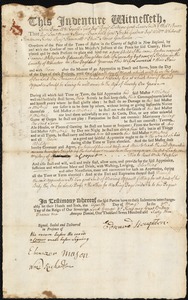Joseph Akley as an Adult
Being sued for tarring and feathering a Customs officer wasn’t the only big event in Joseph Akley’s life in the spring of 1771.
On 16 May, still aged only nineteen, Joseph wed Margaret Durant, according to Boston’s list of intentions to marry.
I can’t find a record of what church the couple married in or anything more about Margaret Durant. But there’s no record of a child coming quickly.
Instead, the couple’s first recorded children were baptized at King’s Chapel:
- Joseph on 5 May 1773.
- Margaret, 12 Mar 1775. [Transcribed “Skeley” in some publications.]
Massachusetts Soldiers and Sailors of the Revolutionary War lists only one “Joseph Akeley.” He did twenty-one days active service in Capt. Hopestill Hall’s company of Col. Lemuel Robinson’s Massachusetts militia regiment. That was in February 1776, when Gen. George Washington was desperate for any men to shore up the siege lines.
That “Akeley” was recorded as enlisting in Roxbury. But that would be consistent with the Akely family having left Boston after the war started. It’s also understandable that Joseph Akley, father of young children, didn’t go into the Continental Army full-time.
By the 1790s we see Joseph Akley listed as a hairdresser in the Boston directories. He owned real estate, having overcome the poverty of his early years.
Indeed, the Akley family seems to have gained a little stature. When Joseph’s mother, Tabitha Akley, died in 1790 at the age of seventy, her death was noted in newspapers across the state. Only twenty years earlier she had been in the Boston almshouse.
On 13 Nov 1794 the American Apollo reported this death:
At Point-a-Petre, Guadaloupet Mr. Joseph Akely, jun. of this town—a worthy young man, whose death is much lamented by his most cursory acquaintance, Æt. 22.Presumably the Akleys’ oldest child was on some sort of mercantile voyage when he died.
On 1 Nov 1808, the New-England Palladium reported that the barber Joseph Akley had died the previous day at the age of fifty-six. His widow Margaret was appointed executrix.
The 1810 U.S. Census lists Margaret Akely living alone on Hanover Street in Boston. That could be the widow or her eldest daughter, unmarried.
TOMORROW: The Akely brothers at war.


